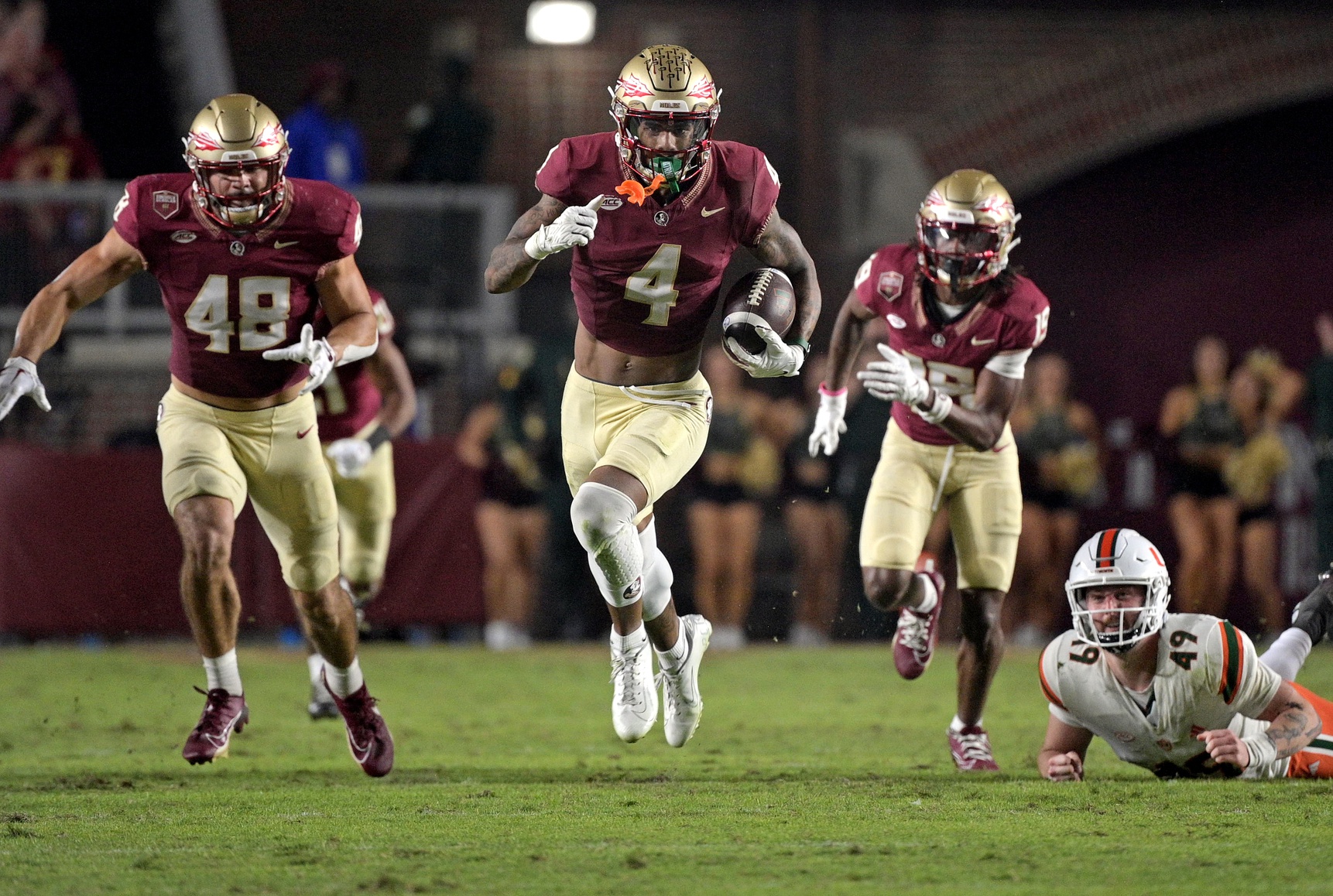Between a Supreme Court decision and a shift in the court of public opinion, the once-mighty NCAA has begun to lose control over college sports—and its ability to enforce its own rules. But that hasn’t stopped the governing body from plodding forward with infractions cases related to NIL, even as it continuously writes and rewrites NIL rules in order to create the illusion of power over its membership.
On Thursday, the NCAA’s infractions committee handed down punishments to Florida State in the first-ever case in which the governing body could prove NIL was used as a recruiting inducement.
It found that an assistant coach on the FSU football team arranged a meeting with a prospective transfer and a booster, who offered the athlete a deal with an FSU collective for about $15,000 per month if the athlete transferred to the Seminoles. The coach allegedly lied to the NCAA about his involvement in the meeting. (The coach was offensive coordinator Alex Atkins, and the collective was Rising Spears, according to reports.)
The actions violated several NCAA rules: using NIL as a recruiting inducement; allowing prohibited contact between a booster and a prospective athlete; and having a coach facilitate a meeting between an athlete and a booster. The list of punishments was long, though none required vacating wins or shutting down the program, nor did they punish the athlete in question, who ultimately didn’t transfer to FSU. Along with several new recruiting restrictions, the NCAA is forcing the booster and the collective to “disassociate” from the Seminoles for a certain period—the first time the NCAA has done so in the NIL era.
The entire case illustrates how the NCAA, losing control and relevance over teams and conferences, wants to create an illusion of power.
FSU’s conduct, while in violation of NCAA’s rules, is certainly not rare—it’s an open secret that coaches, boosters, and collectives are making offers to players, who are entering the transfer portal or going on recruiting visits with an expectation of learning how much they could earn. The NCAA clearly wanted to make an example of them in a likely unsuccessful attempt to slow this behavior.
While considered harsh, the punishments are further proof of the NCAA’s lack of power.
The 2021 Supreme Court case NCAA v. Alston, in which the NCAA lost 9-0, set a new legal precedent where the NCAA has become fearful of enforcing compensation restrictions or punishments lest it violate federal antitrust law. The NCAA was able to hand down these infractions through a process called a “negotiated resolution,” where FSU agreed to cooperate with the NCAA and agreed to all penalties. This system is used to prevent an antitrust lawsuit—if FSU hadn’t agreed to it, the school could easily sue the NCAA for antitrust violations. To that end, it’s unclear how the NCAA would enforce its disassociation requirement.
The first case involving NIL was decided in the spring of 2022. The NCAA found recruiting violations in a meeting involving basketball players Haley and Hanna Cavinder and Miami booster John Ruiz, though it couldn’t prove that an NIL deal had been used as a recruiting inducement. The Cavinder twins, for their part, mocked the decision on social media. They then went on to help the Hurricanes with an unprecedented March Madness run.
However, the headache and potential PR incidents related to NCAA infraction decisions are enough to scare some schools.
“The NCAA is attempting to create precedent to guide schools’ future conduct,” Dan Lust, Moritt Hock and Hamroff sports attorney and New York Law School professor, tells Front Office Sports. “That said, is the NCAA truly ready to open up the floodgates of enforcement, or will this be seen historically as another outlier similar to Miami women’s basketball and the incident with the Cavinder twins? If this is the true dawn of the ‘NIL enforcement era,’ the NCAA has set the bar, and schools must take notice.”





![[Subscription Customers Only] Jun 15, 2025; Seattle, Washington, USA; Botafogo owner John Textor inside the stadium before the match during a group stage match of the 2025 FIFA Club World Cup at Lumen Field.](https://frontofficesports.com/wp-content/uploads/2026/02/USATSI_26465842_168416386_lowres-scaled.jpg?quality=100&w=1024)
![[Subscription Customers Only] Jul 13, 2025; East Rutherford, New Jersey, USA; Chelsea FC midfielder Cole Palmer (10) celebrates winning the final of the 2025 FIFA Club World Cup at MetLife Stadium](https://frontofficesports.com/wp-content/uploads/2026/02/USATSI_26636703-scaled-e1770932227605.jpg?quality=100&w=1024)










